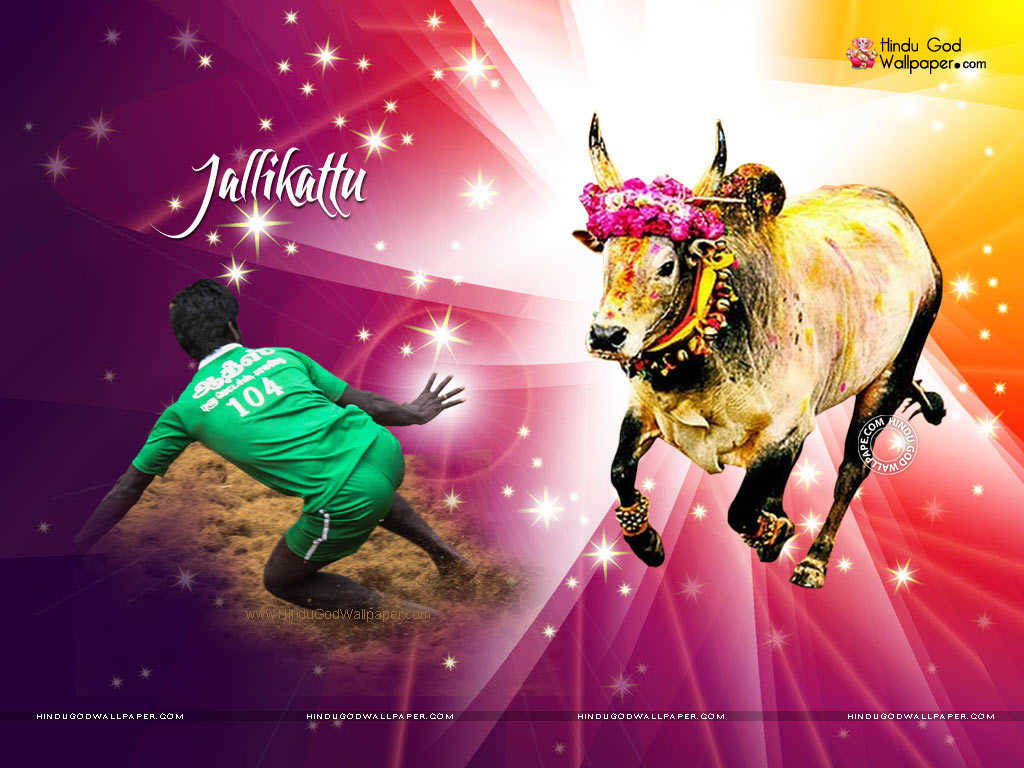Some call it as Sankranti or Sankranthi, some call it as Bihu, some others call it as Sankraman, and in Tamil Nadu, they call it as Pongal. All in all, the occasion is the same. January 14th or 15th is celebrated across India as the auspicious day when the Sun moves to the Northern direction, or as it is called in Sanskrit, Uttarayana. The occasion itself is called as Uttarayana Punya Kala. The day also happens to be a harvest festival for farmers and celebrations are held across the country. Bullock cart races are conducted in parts of Karnataka and Andhra Pradesh, cattles are worshipped, and it is a joyous occasion.
In the state of Tamil Nadu, Jallikattu or the taming of bulls is a very important part of this festival. The word Jallikattu is from the Tamil words Salli and Kattu, referring to silver or gold tied to the bulls’ horns.
The bulls are specially bred for this purpose and the event is witnessed by people in large numbers. Bull is a holy animal in Hindu mythology and is often used as the symbol of the God Nandi, the vahana of Lord Shiva. The temple bulls across villages in Tamil Nadu are worshipped with great devotion on this day. The people treat cattle as family and the temple bull is treated as the head of the family.
Jallikattu is an ancient tradition that has been practiced since the time of the Sangam period (5th Century BC to 7th Century BC), which was also the golden period for Tamil literature. Jallikattu is also used to select the bulls for activities according to their performance. The tamed bulls are used for agriculture and farming. Whereas, the strong, untamed bulls are used for breeding the cows.
The bulls that participate in the event are not random bulls. The people take extreme care in order to make sure that the bulls are fit to take part in such an event. The training begins when these bulls are just calves. They are given nutritious diet and trained to become strong, sturdy bulls. The Tamil Nadu State government has made sure that the bulls are tested once for alcohol in the presence of a government doctor, before they are allowed to participate. Even the youth who participate in the event, are tested if they have consumed any intoxicating substance.
Sufficient precautions are taken to make sure that accidents don’t happen. Despite this, PETA India and other animal activists have protested against the event since 2004. They were able to convince the Supreme Court of India to ban the event in May 2014. The Government of India, on strong appeals made by the people and the government of Tamil Nadu, permitted the event to take place in January 2016, along with some conditions. However, the Supreme Court on 12 January, 2016 ordered a stay and refused to overturn its ban.
Pongal this year falls on the coming Saturday, and the Chief Minister of Tamil Nadu, O Pannerselvam has written to the Prime Minister Narendra Modi requesting him to allow the Jallikattu tradition to continue. People across Tamil Nadu are holding demonstrations so that they can legally carry on their ancient traditional event. Celebrities too have voiced their support for the event. Eminent actor Kamal Hassan, who is actually an atheist, has also voiced his support for the event.
The Supreme Court of late has interfered a tad too much in the matters of Hindu festivals. First, they banned the Jallikattu and later tried to ban the Dahi Handi celebration during Krishna Janmashtami in Maharashtra. Later, they fixed the height of the Dahi Handi, god knows based on what calculations. Jallikattu is an ancient event and is an important part of Pongal celebrations in Tamil Nadu.
Precautions must be taken, but banning the event itself is unwise.
